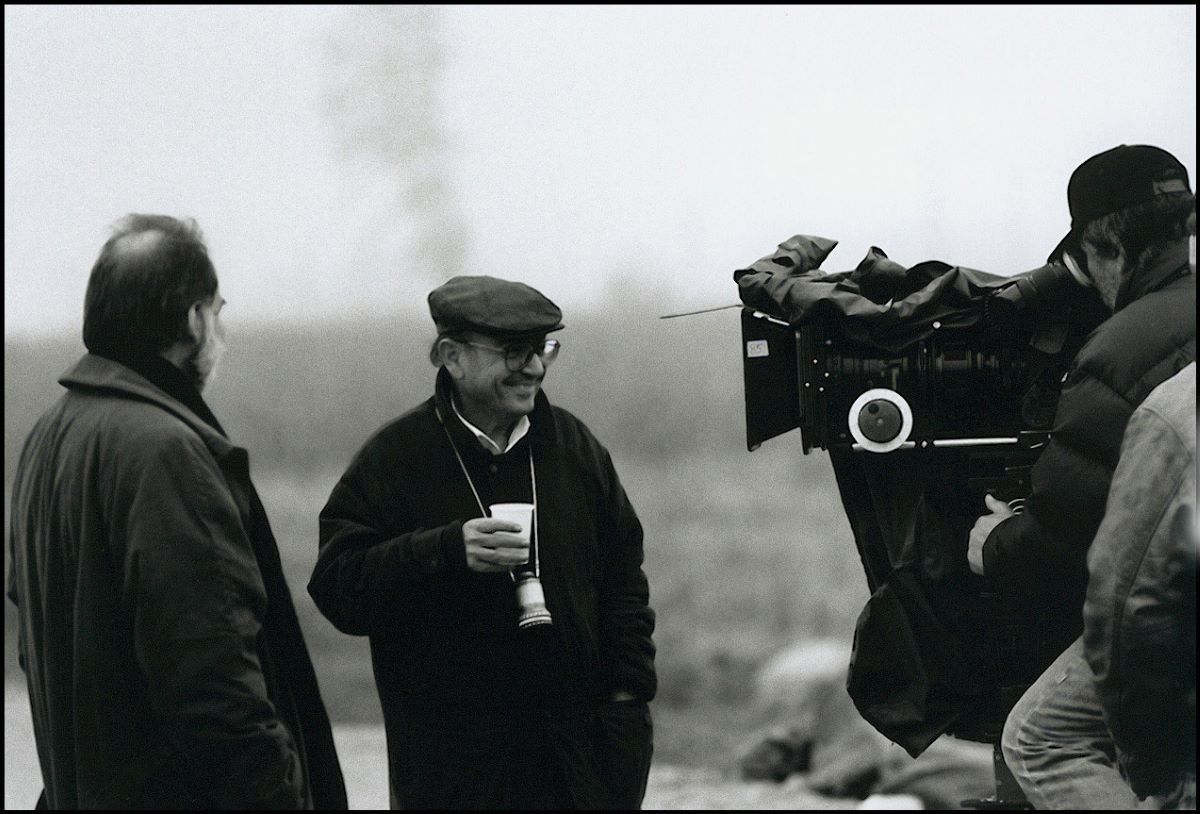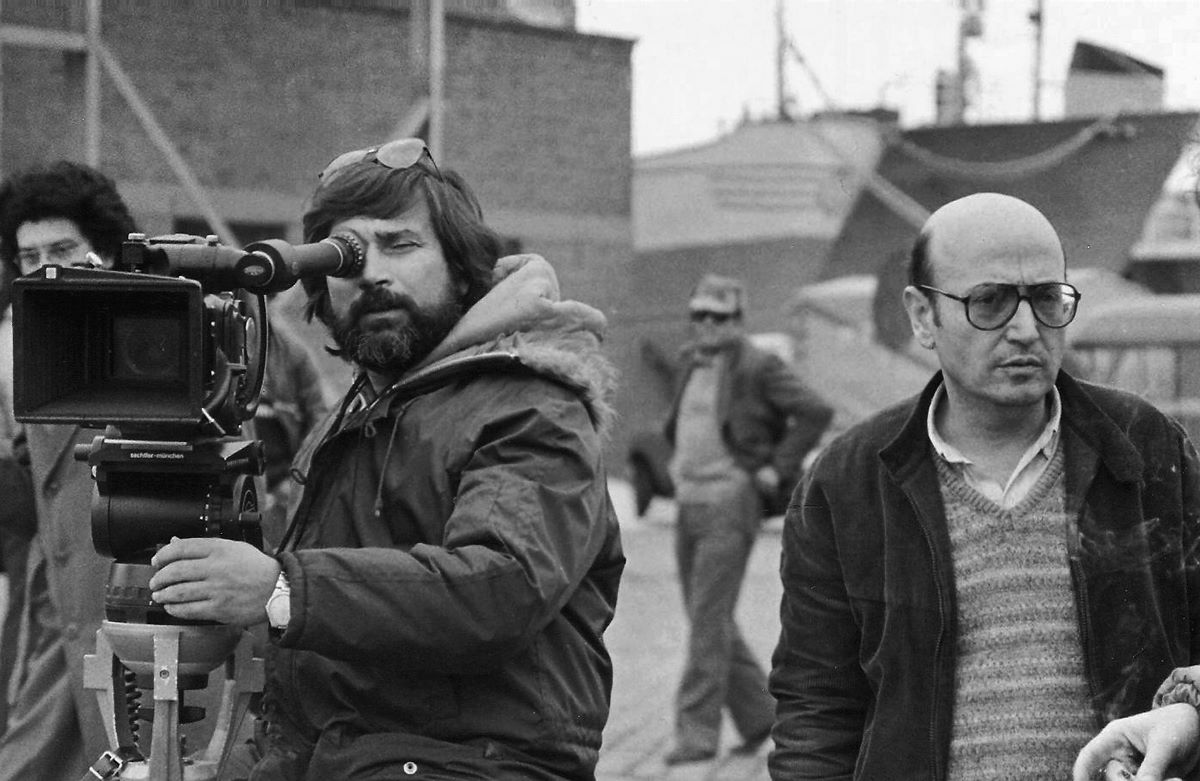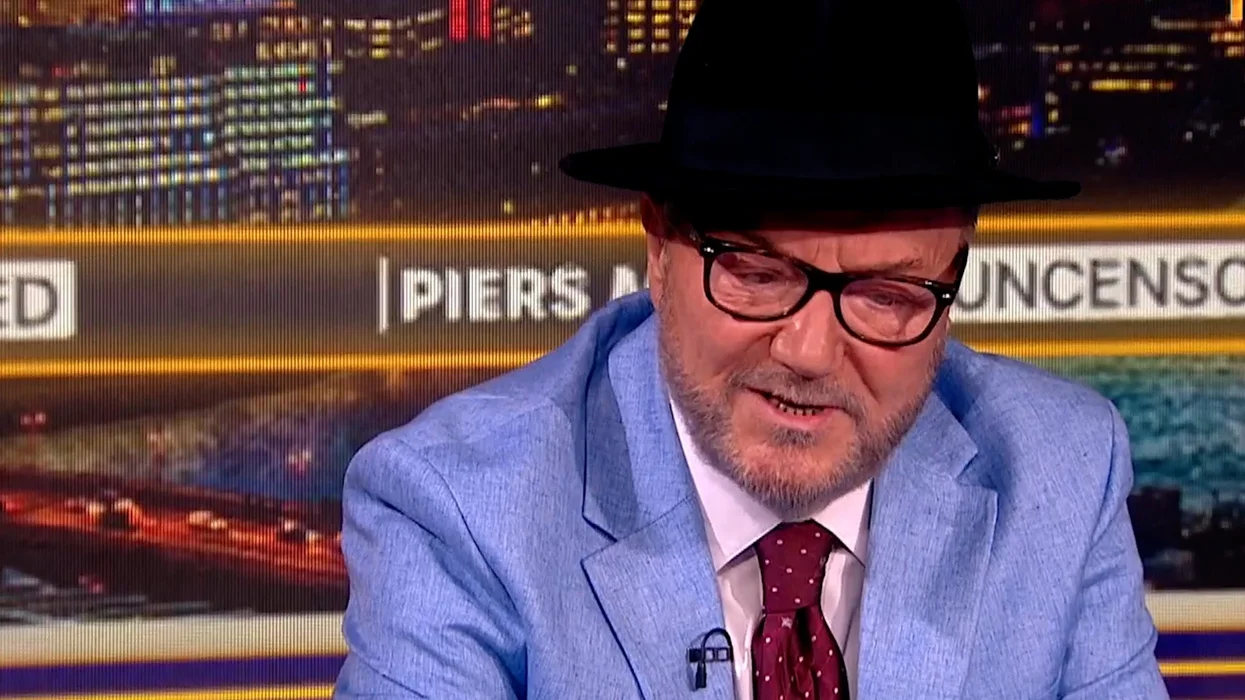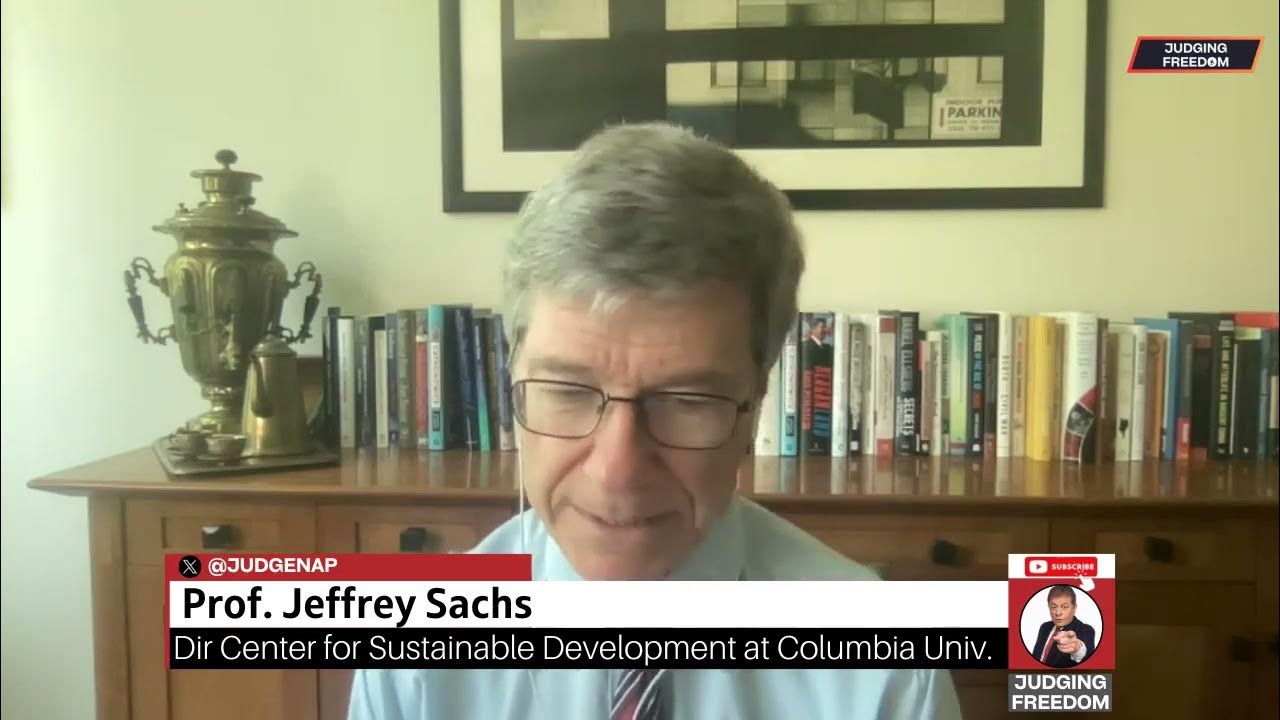Co-writer Hampton Fancher is also credited as executive producer of Blade Runner because he is the man who, in 1975, conceived of turning the book into a film.
He’s an actor who appeared in 10 movies and some 100 TV shows. Blade Runner was his first script. Although his attention was directed to Dick’s novel in 1975, Fancher had to wait until 1978, when rights to the book (previously under another option) became available again. Fancher previously discussed writing Blade Runner in STARLOG #58.
STARLOG: What first attracted you to Do Androids Dream of Electric Sheep?
HAMPTON FANCHER: I had been what you might call an underground filmmaker, and never got a chance to get anything that I had written, and that I wanted to direct, off the ground. Over the years. I eventually learned that the way to do that was to do something that was commercially feasible. It was around 1975, and I decided to look for a property that had some kind of commercial feasibility. I’m not a science fiction fan, and I am ignorant of science fiction, but someone suggested that I read Do Androids Dream of Electric Sheep? I saw in it a possibility.
I didn’t think of writing it or directing it. I just thought that, if I got something like that going as a producer, it would put me into more familiar ground with front-office Hollywood. So. I decided to option the book.
Philip Dick turned out to be very elusive. His agent didn’t even know where he was. I ran into Ray Bradbury one day, after 1 had given up trying to find Dick. and he gave me Dick’s phone number So, I called him. But Dick was very suspicious of Hollywood, and of me. I met him, and we had three meetings over a few weeks. Even though we made contact, he continued to be elusive, and though we liked each other, I felt that he thought I was a “Hollywood” producer. But I wasn’t: I was just a filmmaker trying to do this because I felt it could be an interesting film. I didn’t have an approach to it. I was naive enough to think that he might!
We didn’t get anywhere, and finally, I dropped it. Then, a few years later, in 1978, a friend of mine. Brian Kelly, the movie’s other executive producer, was looking for something to do. I just mentioned the book to him, saying to do it if he could. He succeeded rapidly! I guess Dick needed the money. There was nothing like what I went through. He just called the agent, and within a day, he owned the property.
Brian was a fairly well-known actor [from the Flipper TV series], but had to drop out of acting after a motorcycle accident paralyzed him on the right side. He wanted something to do, and films were his love. At that point in time, he had made two films with Michael Deeley, the producer, in Europe. So, Brian took the property to Deeley, who read the book and said. “No way!”
Do Androids Dream… wasn’t the kind of thing that even someone who’s professionally involved could easily picture as a film. Dick is very obscure and purposefully ambiguous in his writing; maybe it would take a filmmaker to un- derstand how to deal with it. I didn’t even see how to deal with all the components. I just saw one simple thing that you could hang a lot onto, and which I thought would be intriguing: The “”bounty hunter chases androids” theme. There’s a Kafkaesque atmosphere about the book that I enjoyed. But there was also a whiff of something else in the book that I thought could be turned into something close to my heart. I didn’t think that then, at least not consciously, but I must have subconsciously done so. or else I wouldn’t have pursued it.
But I didn’t have anything to do with it at that point. Then. Brian came back to me and explained that Deeley didn’t like the book, and he didn’t understand how it could be done as a movie. “What can I tell him?” Brian asked. I told him to say this and that. So, he asked me to write it down as an outline, which I did. It was basically a simplification of the novel in eight pages. He gave it to Deeley, who said no again. Brian came back to me distraught, and I felt guilty that I had talked him into spending $2,000.
Then, Brian entreated me into doing, if not a screenplay, at least a treatment. I refused at first, but Barbara Hershey, the actress, who knew about all of this, told me it was a perfect way to achieve what I was trying to do. If I believed that this was what I wanted to do, and if I wanted to make it happen, why didn’t I write it? So, I made a 50/50 deal with Brian, and I started work on the first draft.
The first two drafts were very much in keeping with the book’s themes. A problem that you can run into in Hollywood is that, if it reads well, they don’t know how to deal with it! But Deeley fell in love with it, and he made us feel that we had it made, and we felt that we had a producer with a lot of power, because he had just won an Academy Award [for The Deer Hunter] and many people were romancing him.
Still, none of the studios would say yes. I realized later that we were going to make a movie that nobody understood. There were four or five drafts. I lost my naïveté and got more experienced in what was needed, and adapted scenes that were in the first drafts into better substance.
STARLOG: Did you leave out the book’s religion of Mercerism, for instance?
FANCHER: I don’t think Mercerism even got past the first draft. I was going to put it back in, but didn’t because I finally didn’t know what to do with it. The next thing that went — and that was terrible for me, for I still love these old drafts — was Buster Friendly, and what I had done with him.
Basically, at that point, the plot was that of a man trying to get enough money to buy himself a real goat. That was still in when Ridley came on. Everybody liked it, but they were afraid of it. I was dealing with people who didn’t have the same commitment to Mother Earth. It was a bitter struggle and it took a year! In a sense, they won, but in another sense, the educational process for me in terms of writing was worth it. Eventually, I came up with a much more important theme, which was even closer to my heart: The empathy theme, what’s wrong with man.
STARLOG: You mean that Deckard’s character changed from someone looking to buy an animal, to someone who’s now questioning his concepts of what’s right and what’s wrong?
FANCHER: Right! I was always trying for that, but I finally got it more simplified and defined. It got so good by the last script I thought I was in good shape! What got refined in the last three drafts was the theme of a man who was questioning his own conscience, or lack of one, and that the very thing the hero was trying to kill for being a machine, was in fact, less mechanical than he was!
It was that discovery of his own soul, falling in love with the thing he had to kill. It was an agonizing process for that man, and a dramatic one too.
STARLOG: How did Ridley Scott get involved?
FANCHER: There were four drafts written, and a very fine director came in for awhile, but had trouble with the studio we were dealing with at the time, Universal. That’s Robert Mulligan, whom I respected a lot, and who was very neat to work with [Mulligan directed Summer of ’42, The Other, To Kill a Mockingbird]. We did one draft together, and then we couldn’t make sense financially with Universal. So, Mulligan left, and then we left Universal. They weren’t committed yet, and they wanted a “Happy Ending.” Mulligan and I wouldn’t do it.
Right around that time, Ridley, who had been sent the script and liked it, but didn’t want to do another SF picture, changed his mind and decided to do it. He, of course, was the reason the movie got made. We were in trouble because everyone said, “You’ve got to have a director, because this is too weird a film. You need a director to insure its value.”
It was true in a sense. Two days after Ridley got into town and talked to us, every studio in town called and said, “How much do you want, and when do you want to go?” So, we made a deal with Filmways, and then they went, “Pffft!” Ridley is very imaginative and many-faceted, quirky and fun to work with, but difficult to tie down. I found myself getting excited about many things, and disliking many other things. We had a real basic disagreement on certain sentiments. It was an arduous process, as well as a fulfilling one, and certainly a very educational one.
STARLOG: Was there no way to work out these problems?
FANCHER: No way! I didn’t think that, because Ridley never made me think that. On a dialectical level, when it came to those areas that I disagreed on, and felt justified in disagreeing, I would usually win the argument and feel satisfied that my point had been proven. But two or three weeks later, we would have the same argument all over again! He was just steadfastly hooked into wanting things that I wouldn’t do.
As pre-production began, and things really had to be nailed down, it got really hairy! I wasn’t a hired writer, so it wasn’t as if Ridley could say to me, “Do this and that,” and I would do it. I was also a producer. Finally, I said — because it was Ridley’s film in the end — “If you’re going to do that, you’re going to have to get somebody else to do it, because I won’t!”
I didn’t think he would do it, because the time was too short. We came up with what I thought; and what many people think, was a very wonderful script. It has all those things that I wanted. But they did get somebody else, and it turned out to be David Peoples, just about two weeks before shooting started.
At the time, of course, I was very disturbed, because I didn’t know who David Peoples was. I thought that they had gotten a guy who was going to do anything Ridley wanted, and it was going to wreck the film.
Later, I found out that David did a really good job of translating Ridley’s ideas into script. I was going to go into [Writer’s Guild] arbitration about it. I didn’t know whether I wanted my name or his name off [the screen credit], but I was going to do something about it, until I got the script. Then, I thought, “Hey, this guy is neat!” I really liked his work, and then, the animosity, jealousy and all that stuff disappeared. Now, we’ve become friends!
What was disappointing was that I don’t think even David’s stuff came across, because of how it was tampered with by people who weren’t writers, but producers, secretaries, associate producers, directors. There’s a discombobulation, a lack of cohesion and coherency.
STARLOG: What do you think of Blade Runner being promoted as a detective story of the future?
FANCHER: That was Ridley’s idea. That’s the first idea that I gave in to. I hated it! What happened was that after literally three months of fighting, I gave in, and decided to fall in love with it instead, because it was, after all, a way to get everything through. It’s a wonderful thing in a movie if you can, on a superficial level, get people to be hooked and then, just below that, have a message.
I was against it at first because I thought it was a cliche and very unoriginal, but when I saw his graphic ideas about how to handle it, in a kind of Gothic or Kafkaesque manner, I started to think, “Wouldn’t it be interesting, we could have a voiceover narration and all that kind of character.” I originally had Deckard as a little bureaucrat, a guy who wasn’t too sure of himself, but then I thought that it was better to have an extremely macho guy and then have him cut down so he doesn’t know where he’s coming from.
That’s what I started doing by the sixth draft, and eventually, I think I arrived at it in the last draft, number 10! But they didn’t even go for that, and they left the underpart out. Ridley didn’t want any vulnerability, but at the same time, he didn’t make Deckard macho.
The deepest thing I had was the love story. I don’t think they ever saw it as a love story. For me, the most noble person in the film, the person with the most to lose and who was willing to lose it, was Rachael. I liked matching her against a macho jerk who was totally sexist-oriented in that stupid detective way. Then, through her, he becomes otherwise — but he still loses her.
STARLOG: Why was the world changed from being empty to being overcrowded?
FANCHER: I guess it was just looking at New York, Mexico City and what’s happening now. Which was a great idea!
Many of Ridley’s visual and atmospheric concepts are interesting. My atmosphere was much more naive. I didn’t really create much of a world. You could have pretty much taken my first draft and put it on a [theatrical] stage. There weren’t many exterior scenes, there wasn’t much hardware. It was basically a small drama being done for $9 million.
STARLOG: Do you agree with Dick’s rather bleak view of the future?
FANCHER: Not necessarily, but bleakness to me is watching a tourist suck an ice cream cone!
Any kind of art that moves or inspires you, and has something that’s bleak about it, can be a strong inspiration and can make your life bigger. Definitely everything I did up to the last draft was a warning. I had to have something I was saying, or else I couldn’t have written it!
I wasn’t advocating bleakness, of course, I was warning about it, and empathy had much to do with it. But there was, always, even in the bleakest of my drafts, a lesson that engendered hope.
I wanted the last moment to be a thrill. I like proposing some hard questions that way.
RANDY & JEAN-MARC LOFFICIER, veteran STARLOG correspondents, conducted these Blade Runner interviews in 1982. Published (in part) only in France, these talks make their American debut this issue, albeit in abridged form. They will appear, unabridged, in the forthcoming Making Movies 1980-90 (McFarland, hardcover).
Starlog Magazine, Issue 184, November 1992




